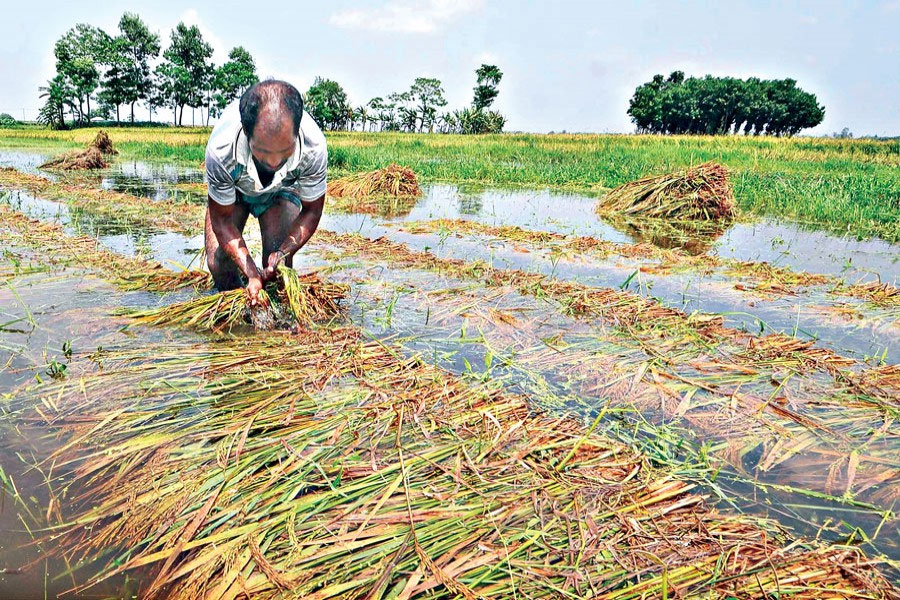
Published :
Updated :

Boro has emerged as the number one provider of cereals for millions of people in Bangladesh, Aman being the second one. Improved farm technology has done the trick here.
As the scorching heatwave tightens its grip on Bangladesh, and temperatures soaring and water bodies drying up, the adverse effects on Boro production has become increasingly evident.
The agriculture ministry forecast production of 22.2 million metric tonnes of Boro this year but, according to experts, the production might be less than that projected due to the latest heatwave.
According to agriculturists, rice paddy is sensitive to temperatures above 35 degrees Celsius, which can cause heat shock.
The country experienced heatwave in late April with mercury rising to a maximum of 43 degrees Celsius in some parts of the country. Though over 70 per cent of Boro was harvested in Haor areas by the end of April, in the other parts of the country 20 per cent of Boro was in flowering stage.
Agriculture experts pointed out that during the flowering stage, paddy plants are vulnerable to heat, which can interrupt their normal growth and later affect the formation of rice grains.
The effect of shortfall in Boro rice production ripple far and wide, affecting not only farmers but also consumers, policymakers, and the overall economy.
At the grassroots level, farmers grapple with reduced yields, damaged crops, and financial strain as they struggle to adapt to the hostile climate conditions.
For many small-scale farmers, whose livelihoods depend solely on agriculture, the decline in Boro rice production translates into a loss of income, pushing them deeper into poverty and vulnerability.
When Boro rice prices surge in response to dwindling supplies, consumers face the grim reality of food inflation, making it increasingly difficult to afford basic necessities.
This inflationary pressure disproportionately affects low-income households, exacerbating poverty and widening the gap between the haves and the have-nots.
The implications of reduced Boro rice production extend to the nation's broader economy and food security landscape.
Bangladesh, heavily reliant on rice as a dietary staple, faces the daunting challenge of meeting the nutritional needs of its burgeoning population amidst dwindling supplies.
The scarcity of Boro rice not only undermines particularly the nation's self-sufficiency goals but also exposes its vulnerability to external shocks, such as climate change and extreme weather events.
It may be mentioned that frequent load shedding and fall in the level of groundwater has disrupted proper irrigation. Consequently, farmers in many areas were compelled to use submersible pumps, which pushed up the production cost. The prices of agricultural inputs were also up this year.
So, many predict escalation of prices of rice due to production shortfall and rising production cost.
In the face of this looming crisis, urgent measures are imperative to safeguard Boro rice production and protect the country's food security. Firstly, there is an urgent need for investment in climate-resilient agricultural practices and technologies to help farmers adapt to changing climate conditions. This includes promoting drought-resistant rice varieties, improving water management techniques, and enhancing agricultural infrastructure to mitigate the impact of heatwaves and water scarcity.
Additionally, concerted efforts are needed to strengthen the resilience of rural communities and improve their capacity to cope with climate-induced shocks. This entails providing farmers with access to financial resources, agricultural extension services, and climate information to empower them to make informed decisions and mitigate risks effectively.
Furthermore, proactive policies and strategies must be devised to diversify the agricultural sector, reduce dependency on rice monoculture, and promote the cultivation of alternative crops that are more resilient to climate variability.
By embracing agroecological approaches and promoting crop diversification, the country can build a more resilient and sustainable food system that is less susceptible to the vagaries of nature.
mirmostafiz@yahoo.com


 For all latest news, follow The Financial Express Google News channel.
For all latest news, follow The Financial Express Google News channel.